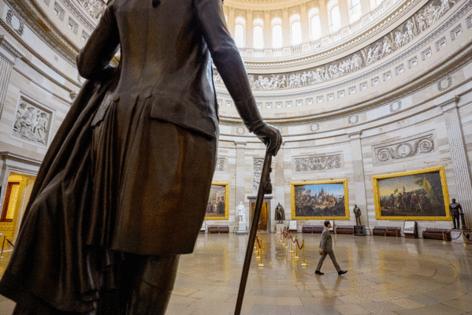Pressure builds to punt full-year spending bills into next year
Published in Political News
WASHINGTON — Opposition is building against passing final full-year spending bills just before the December holiday recess, as some Senate appropriators would like.
Whenever a deal is reached to end the partial government shutdown that is now a month old, there is widespread agreement that lawmakers won’t be able to pass final fiscal 2026 spending measures by the Nov. 21 deadline set in the House-passed continuing resolution that could reopen government if the Senate goes along.
But that realization begs an obvious question: How much more time is needed?
Hard-line conservatives renewed their push Monday for a short-term funding patch that would extend at least into mid-January, warning lawmakers against passing an end-of-year omnibus spending package right before the holidays.
In a pair of posts on the social platform X, GOP Sens. Rick Scott of Florida and Mike Lee of Utah indicated support for a continuing resolution that would extend funding at current levels beyond Jan. 15.
“Democrats shut down the government because they hate President Trump and want to waste more of YOUR dollars after putting the nation on the path for an unsustainable $38 trillion in debt,” Scott wrote. “Any new continuing resolution must extend past January 15 to avoid a Christmas omnibus.”
Lee endorsed Scott’s message in a follow-up post shortly afterward.
While Senate Republicans have acknowledged the November timeline is too soon for Congress to put a dent in hashing out their funding work for fiscal 2026, there are rifts in the party over how long to extend government funding to buy time for spending talks.
Multiple GOP appropriators in the Senate have expressed support for a stopgap that ends before January to keep pressure on lawmakers to hash out their annual funding bills.
Appropriators have begun mapping out a potential game plan on what bills to move once the government reopens. GOP leadership has already pushed for both chambers to formally conference the three bills funding the departments of Agriculture and Veterans Affairs and the legislative branch that the Senate passed as a package over the summer.
Bipartisan funding talks also picked up in the Senate last week, as members face growing pressure to end the shutdown amid rising uncertainty over food stamps payments.
Senate negotiators say they’re eyeing a second potential funding package that combines the Defense, Labor-HHS-Education and potentially other bills, possibly including the Transportation-HUD and Commerce-Justice-Science measures.
“I think appropriators want it to be before the end of the year,” Sen. Brian Schatz, D-Hawaii, a senior appropriator, said last week when asked for his preference for a CR length. “I think December is the most logical timeline,” he said.
Senate Appropriations Chair Susan Collins, R-Maine, has also said that she is “not eager to go into January.”
But GOP leadership in both chambers have yet to land on a new potential end date, particularly with the ongoing partial government shutdown poised to shatter a new record this week after more than four weeks. A White House official said the administration would defer to congressional Republicans for determining the length of the next continuing resolution.
Speaker Mike Johnson, R-La., meanwhile, would prefer a funding extension into January as opposed to December, according to sources familiar with his thinking.
“This is a very important matter,” Johnson said Monday at a news conference. “It’s something that we’re giving all of our attention to. Our leaders will go and meet on the calendar right now. We’re watching every day.”
_____
(Jacob Fulton and Aidan Quigley contributed to this report.)
©2025 CQ-Roll Call, Inc., All Rights Reserved. Visit cqrollcall.com. Distributed by Tribune Content Agency, LLC.
























































Comments